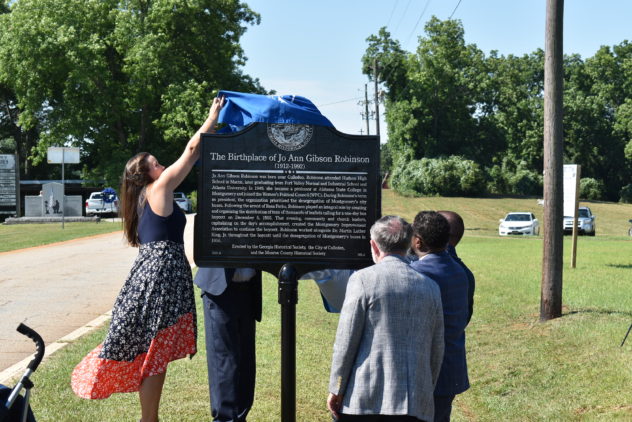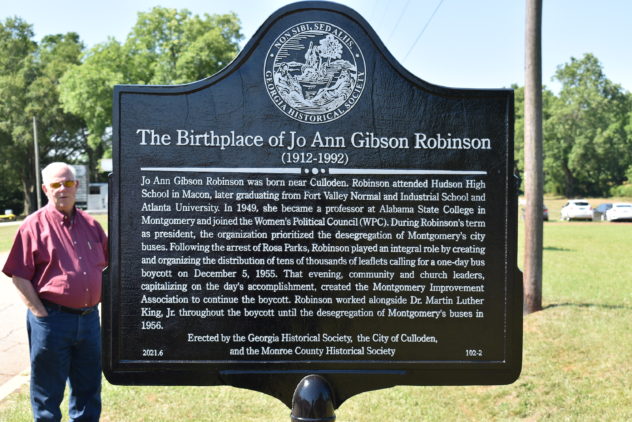A Culloden native and civil rights hero was posthumously recognized on Wednesday for her efforts to bring racial equity to the Deep South.
A crowd of several dozen, including Monroe County Commissioners Greg Tapley and Eddie Rowland, gathered on Old Hwy. 341 in Culloden on Wednesday to commemorate the unveiling of an Historical Marker dedicated to Culloden native Jo Ann Gibson Robinson.
Robinson’s plaque is the latest of about 2,100 historic markers erected around the state of Georgia by the Georgia Historical Society and one of about 40 that make up the Georgia Civil Rights Trail.
Mary Persons High School U.S. History teacher Mark Smith was the event’s keynote speaker. It was Smith’s research on Robinson that brought her story to light to a new generation. And in fact, an article written by Smith on Robinson’s contributions to the Civil Rights Movement was featured in the March 2021 edition of “Reflections”, a monthly magazine distributed by the Georgia Community of Affairs Historic Preservation Division.
According to Smith’s research, Robinson was born on April 17, 1912 as the youngest of 12 children of Owen and Dollie Webb Gibson of Culloden. Her early childhood was spent on the family’s 98-acre farm just south of Culloden. After her father’s untimely passing, her family moved to Macon, where she graduated as valedictorian of her high school class. After attending Fort Valley State University (FVSU), Robinson eventually moved to Montgomery, Ala., where she taught English at Alabama State College.
Inspired by an event earlier in life when a Cleveland, Ohio bus driver ordered her to move from her seat on a city bus, Robinson became an instrumental leader in the Civil Rights Movement in Montgomery. Robinson, who was president of the Women’s Political Council of Montgomery (WPC), began laying the groundwork in 1955 for a city-wide bus boycott. After Rosa Parks was arrested on Dec. 1, 1955 for refusing to leave her seat for a white passenger on a Montgomery bus, Robinson immediately sprang into action. Robinson, with help from two of her students, mimeographed 52,500 leaflets calling for a one-day bus boycott on Dec. 5, 1955 and then quickly set about distributing all of them. The Dec. 5 boycott proved to be a huge success with more than 90 percent African American participation. The bus boycott subsequently continued and led to the creation of the Montgomery Improvement Association of which Dr. Martin Luther King Jr. was selected as the first president.
Robinson eventually died in Los Angeles in 1992, but not before she published her popular memoir entitled, “The Montgomery Bus Boycott and the Women Who Started It”, which remains available for purchase on Amazon.com.
Smith said Wednesday that he hopes Robinson’s “remarkable life” will no longer be lost to history with the erection of the Historical Marker in her honor along Old Hwy. 341.
“Thank you to Mrs. Jo Ann Robinson for her courageous actions,” Smith said.
Other speakers included: Monroe County Historical Society Vice President Ralph Bass, who welcomed guests to the ceremony, Rev. Eddie Johnson Sr. of Thomaston’s Macedonia Baptist Church, who gave the invocation, Culloden City Councilwoman Dr. Margie Bryant, who represented the town of Robinson’s birth, Georgia Historical Society representative Elyse Butler, who helped unveil the plaque, and Thomas Jordan, Robinson’s cousin.
Jordan, who only learned he was related to Robinson in 2010, brought his family down from Cincinnati, Ohio for the ceremony. Jordan detailed their family tree and noted that Robinson has relatives all across the U.S., some of whom are unaware of her vast contributions to American Civil Rights history.
Speaking on behalf of all of Robinson’s extended family, Jordan said proudly: “We unapologetically stick our chest out and claim Jo Ann Gibson Robinson as our cousin.”
After a 30-minute program, the attendees enjoyed a boxed lunch at the Culloden Clubhouse catered by Her Majesty.





